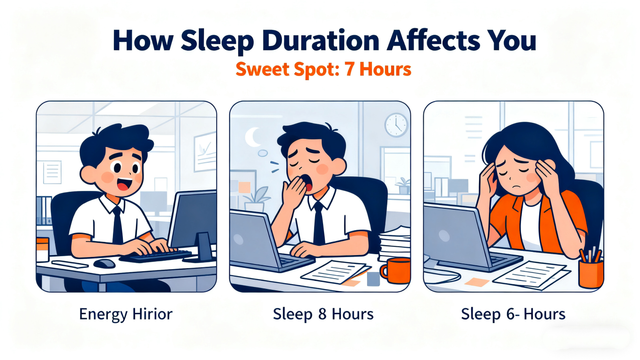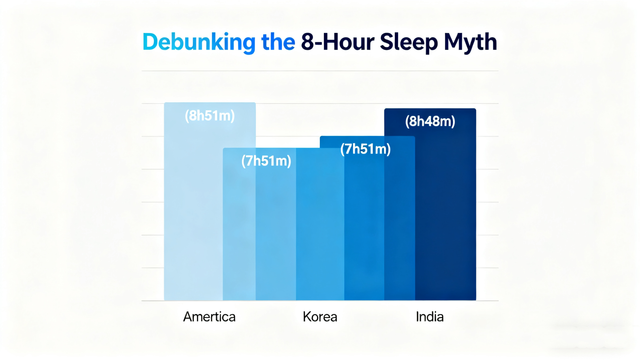Debunking the 8-Hour Sleep Myth: What the Science Really Says
In our fast-paced lives, sleep often takes a backseat. We've all heard the advice that we should get 8 hours of sleep a night, but is this really the one-size-fits-all answer? Recent research suggests that the optimal sleep duration might not be as straightforward as we once thought.
The One-Size-Fits-All Myth
For years, the idea that everyone needs 8 hours of sleep has been ingrained in our minds. However, a growing body of research indicates that this might be a myth. A 2021 study published in the JAMA Network Open, which included over 320,000 Asian adults, found that the "sweet spot" for sleep duration is actually 7 hours a night. In this extensive study, researchers discovered that sleeping 7 hours was associated with the lowest risk of all-cause mortality, as well as reduced risks of cardiovascular disease and other causes of death. In fact, when sleep duration reached or exceeded 8 hours, it was linked to an increased risk of certain health issues.
Sleep Duration Around the Globe
Sleep patterns vary significantly from one country to another. According to a report by the OECD, the average sleep duration in the United States is 8 hours and 51 minutes. However, this doesn't mean that 8 hours and 51 minutes is the magic number for all Americans. Individual needs can still vary widely.
In South Korea, the average sleep duration is much shorter, at 7 hours and 51 minutes. The fast-paced lifestyle, long working hours, and the prevalence of after-hours studying or socializing contribute to this shorter sleep time. A study analyzing a Korean community health survey found that adults in South Korea sleep around 6.5 hours on weekdays, which is well below the recommended 7 - 9 hours by the American National Sleep Foundation.
In India, the average sleep duration is approximately 8 hours and 48 minutes. However, in some regions, especially in urban areas with high population densities and demanding work environments, many individuals get far less sleep. A study in Chennai, India, found that the average sleep duration among the participants was only 5.6 hours, and 71% of them slept less than 6 hours per night.
The Impact of Sleep on Health
Sleep plays a crucial role in our overall health and well-being. Lack of sufficient sleep has been linked to a variety of health problems, including obesity, diabetes, cardiovascular disease, and mental health issues. For example, in South Korea, studies have shown that short sleep duration among young adults is associated with a higher prevalence of hypertension. And in India, the insufficient sleep in many urban areas, as seen in the Chennai study, can potentially contribute to a range of health problems due to the already challenging environmental and lifestyle factors.
On the other hand, getting enough sleep can boost our immune system, improve cognitive function, and enhance our mood. So, while the ideal sleep duration might not be exactly 8 hours for everyone, it's clear that getting an adequate amount of quality sleep is essential.
So, How Much Sleep Do You Really Need?
The truth is, the optimal sleep duration varies from person to person. It depends on factors such as age, genetics, lifestyle, and overall health. Some people might function perfectly well on 6 hours of sleep, while others might need 9 hours or more. The key is to pay attention to how you feel during the day. If you wake up feeling refreshed, are able to concentrate at work or school, and don't feel overly tired or sleepy during the day, then you're probably getting enough sleep.
In conclusion, the 8-hour sleep rule is not a one-size-fits-all solution. By understanding our individual sleep needs and making sleep a priority, we can improve our overall health and quality of life. So, the next time someone tells you that you need to sleep 8 hours a night, you can tell them that the science is a bit more complicated than that!
.png)
